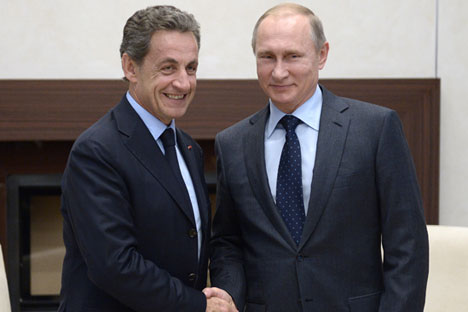
Russia. Moscow region. 29 October 2015. The ex-president of France, the French leader of the opposition party "The Republicans" Nicolas Sarkozy and Russian President Vladimir Putin (left to right) during a meeting in Novo-Ogaryovo.
Ria Novosti/Alexey NikolskyFormer French President Nicolas Sarkozy has arrived in Moscow for a two-day visit, the website Svobodnaya Pressa reports.
His plans include a lecture for students, as well as a meeting with Russian President Vladimir Putin on Oct. 29. The politicians will discuss bilateral relations between Russia and France, the war in Syria and current international issues.
Russian experts say that Sarkozy has a good chance of returning to the Élysée Palace since the rating of the current French authorities has been affected by the country's economic stagnation as well as the migrant crisis.
"Sarkozy's visit is quite a significant event," said Alexei Kuznetsov, head of the Center for European Studies at the Institute of World Economy and International Relations.
"The current president, Francois Hollande, is not very popular in his country, and there will likely be a change of power in France after some time. In this respect, communication with Sarkozy can be very useful."
However, according to Alexei Pilko, director of the Eurasian Communications Center, Sarkozy is “trying to play on the sympathies of voters and criticizes Hollande's foreign course. But it is not a fact that if Sarkozy himself had held the presidency, he would have conducted a different policy.”
"Many people in the country do not like the fact that France coordinates its foreign policy too closely with the United States. Sarkozy is trying to take advantage of this," he said.
NATO is once again discussing plans to expand and strengthen the alliance's presence on the borders with Russia, the website Vzglyad reports.
Romanian President Klaus Iohannis said on Oct. 29 that nine countries in Central and Eastern Europe had agreed to make a request to NATO to extend the alliance's presence in the region.
Iohannis said that he considered it necessary to tighten security on the eastern borders of Europe, and also mentioned the threat from the south – including from Syria. According to him, the call to increase the presence of NATO in Eastern Europe was supported by Bulgaria, the Czech Republic, Slovakia, Hungary, Estonia, Latvia, Lithuania and Poland. Officially, the request will be submitted to the alliance's leadership at the NATO summit on Nov. 4.
"Realizing that their policy is being eroded, the Americans are working very quickly toward creating a direct confrontation system in Europe," said Sergei Karaganov, dean of the Faculty of World Politics and Economy at Moscow’s Higher School of Economics, explaining that the goal is to recreate the atmosphere of the Cold War.
They will not succeed in fully implementing this idea, he said, as the Germans, the French and the majority of continental Europeans do not want to create a system of such a confrontation, but partly, some forces may be deployed, and it will be another issue dividing Russia and NATO, another cause for debate.
Meanwhile, NATO Deputy Secretary General Alexander Vershbow said in Madrid on Oct. 29 that the alliance's rapid reaction force in Eastern Europe must "make clear to Russia that they shouldn’t even think of messing with NATO."
Germany's largest suppliers of weapons, Anschutz and Walther Arms, are trying to get sporting guns out from under the sanctions against Russia, the daily broadsheet Izvestiya reports, citing Anschutz's Russian spokesman Vladimir Nosikov.
The company had been supplying weapons to Russian biathletes for nine years, however, due to the EU and U.S. sanctions imposed in July 2014, the Russian market was closed to it.
According to Novikov, the firearms manufacturers have made a request to the Federal Office for Economic Affairs and Export Control to allow supplies to Russia.
"The entire Olympic sporting weapons system works with the .22 caliber, which also fell under the arms embargo. The European Union, and Germany in particular, do not give an export license to their arms makers because of the Crimean events, so you cannot bring weapons from the EU," Nosikov said.
The same fate befell the Finnish supplier of ammunition for biathlon – the company Lapua. The Russian Biathlon Union says that one of the main issues now is to find domestic alternatives.
All rights reserved by Rossiyskaya Gazeta.
Subscribe
to our newsletter!
Get the week's best stories straight to your inbox